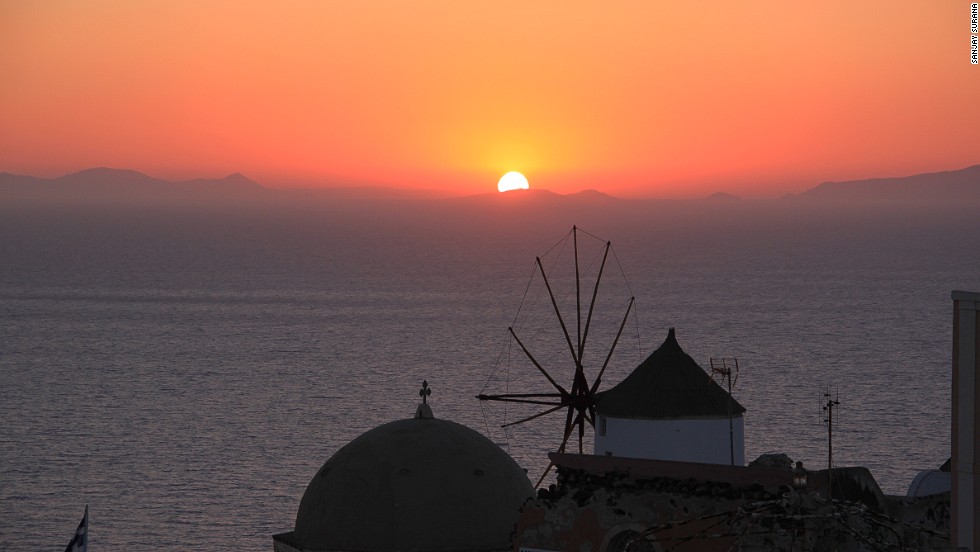
(CNN)Greece’s rejection of Europe’s latest bailout offer has raised uncertainty for millions of vacationers planning to head there for their summer break.
With a “Grexit” from the eurozone an ever increasing prospect, banks remaining shuttered and concerns over shortages of basic goods, many will be questioning whether or not to cancel their trip.
The situation remains in flux, with few definitive answers.
But here’s what we know at the moment:
Should I go?
On the downside, it’s likely that a vacation in Greece will involve added inconvenience, particularly when it comes to financial transactions.
This could just mean waiting in line longer at an ATM.
But there are outside risks of visitors being stranded in the event of fuel shortages or logistical woes brought about by the ongoing crisis.
That needs to be weighed against the fact that many people are currently enjoying, and will continue to enjoy, peaceful, trouble-free vacations in Greece.
Greece needs tourism income more than ever now and many in the hospitality industry are working incredibly hard to ensure travelers enjoy their stay without a hitch.
In terms of value, there’s probably never been a better time to visit in recent years.
Bookings are in decline and there are bargains to be had in resorts that are now far less busy than usual.
The crisis has dented the strength of the euro, meaning that non-eurozone travelers will enjoy cheaper prices.
These are likely to get cheaper still if Greece crashes out of the euro.
Should I bring cash?
The overwhelming advice appears to be yes, bring as much as you will need.
ATMs in many parts of the country are still working, but there have been accounts of money running dry in others.
Banks have remained shut in Greece for more than a week and limits placed on withdrawals by Greek customers.
There are no extra restrictions on foreign account holders, but an upsurge in demand has resulted in long lines at some ATMs and, in some cases, cash shortages.
For the most part, credit cards will continue to work, but with uncertainty hanging over the future of Greek banking, there could be problems.
Many experts are now advising tourists to bring cash to cover their entire trip.
In response, some insurers have increased their limits on the amount of cash they cover, so it’s worth checking your policy.
Are tourism businesses making contingency plans?
Sophia Antoniadou, co-founder of Discover Greek Culture Tours, based in Athens, recently told CNN that travel operators did not foresee emergency scenarios and were confident the fiscal crisis would not seriously impact the travel industry — at least not this summer.
That said, travelers may again want to consider taking out good insurance to cover themselves in the event of getting stranded.
Is there any danger that credit cards will no longer work?
With Greek banks in jeopardy, it’s a real possibility.
Even if they continue to work, many smaller hotels and restaurants may switch to cash only due to the current money controls.
If Greece drops out of the euro, will places still accept euros?
Panagiotis Zarifis, a banking and investments executive based in Athens, says that in the “highly improbable event” that Greece returns to the drachma, the U.S. dollar and the euro will still be accepted.
“It’s well known that these strong currencies are always preferred by businesses, in any country, should there be any economic insecurity.”
Are there any safety issues? Any danger of unrest, increased crime?
Athens has witnessed several major outbreaks of unrest since its financial crisis began, but while there have been recent demonstrations, locals say any risk from turmoil is small.
“Greece is quiet and peaceful and the people are still as warm and hospitable as ever,” Athens resident Georgina Tzevelekou told CNN last month.
“Of course, Greeks are worried about what may happen but that isn’t something that will affect or harm the visitors in our country.”
Tzevelekou points out that even when Athens or other mainland cities have been the focal point for protest, these have not spread to the prime vacation destinations on Greece’s islands.
“The Greek people understand very well that tourists are helping Greece and our economy,” she adds. “Furthermore, the Greek islands have always been peaceful and the atmosphere there has never been affected by what happens in the capital.”
Will the ferries still be running? Is there any risk of getting stranded?
Many Greek vacations depend on the network of ferries that connect smaller islands to airport destinations.
So will these still run if the crisis reaches breaking point?
“There’s no indication there would be such cancellations,” says Stephanie Anastasiou, who heads up Ask2Travel Group, Yachts-sailing.com and the Entrada Central Reservation System.
“The most important thing to remember is that tourist businesses are privately-owned companies that have nothing to do with the government and the public sector.
“A business in Greece will not stop operating when there are customers to serve,” she says. “Such businesses have proven to be fully operable even in more difficult times during these past crisis years.”
Are there likely to be any power cuts or food shortages?
There have been reports of supplies of food staples and basic medicines running out in Athens and some popular tourist islands as importers struggle to pay their bills.
But others say shop shelves remain fully stocked.
Previously, hoteliers and officials have pledged resilience in the face of the crisis, saying that unpredictable fluctuations in supplies are unlikely to impact tourists.
“I run a five-star luxury hotel and I am not concerned about supplies,” Theodore Agiostratitis, Managing Director of the upscale Margi Hotel in Athens, told CNN late last month.
“When it comes to this aspect, the tourism industry will be taken care of — as usual.
“All tourism destinations are well prepared and equipped for the summer period. Tourism is very important to Greece.
“Even if the worst happens, it is going to affect the economy and operations after a number of months not from one day to the next.”
Are prices likely to go up or down?
No one wants to find themselves on the wrong side of an exchange rate meltdown, suddenly finding prices surging midway through a vacation.
Doulis Carafil, CEO of private charter company Air Business International, says while Grexit might herald economic turbulence, foreign travelers will win out.
“Should Greece default, prices will drop even more and the tourist experience will only get better,” he says.
“This is proven by changes that have taken place as we went through the worst of the crisis over the past few years. “
Given the situation, will Greek people be happy to see tourists?
“We Greeks are famous for our hospitality and we’re proud of that,” says Yorgos Geniatakis, general manager of the Minos Imperial Luxury Beach Resort in Crete. “Of course Greek people will be happy to see tourists.
“First and foremost because it’s our culture dating back to ancient times and no political situation could affect that.
“Secondly, Greece depends on tourism, so tourists will be welcome.”
Geniatakis says visitors shouldn’t worry about packing extra euros, but should be worrying about packing media-driven anxieties.
“If tourists arrive positive they will leave positive,” he adds. “It is the time to enjoy Greece.”
[“source – cnn.com”]












